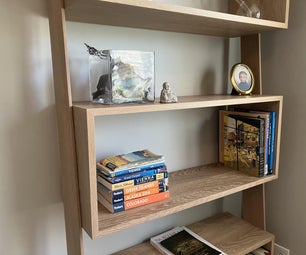Introduction: 3D Pyramid Hologram
In this Instructable I'll be showing you how I made a 3D holographic Pyramid. You're probably asking "what is that?" So let me explain. This is basically a design using angles of refraction, angles of reflection, a computer monitor and 4 congruent trapezoids made out of plexiglass. 4 images will be processed on the computer screen and those images will reflect into the Pyramid, giving you a 3D image inside. As we move further into this Instructable, you will understand more on how this works. Have fun and good luck!!!
Step 1: SAFETY!!! SAFETY FIRST!!!
Please begin by cleaning your workspace. Make sure you wear goggles or even a face mask, which I wore. Tie hair back if long. Roll up your sleeves. You know the drill.
Step 2: Acquire Any Materials That You Will Need
You will need:
- Plexiglass
- Table Saw
- Radial Arm
- Square
- Wooden Ruler (wooden for more accuracy)
- Very Fine Tip Sharpie
- Concrete glue/ super glue
- Duct Tape
- Computer Monitor (plus whatever comes with your computer)
- Scrap Wood
Step 3: Planning
First you want to know how big you want your Plexiglass pyramid to be. You will need to use the dimensions 1:6:3.5 (Image one) for starters. Having these dimensions allow you have a perfect trapezoid no matter what size you decide to make your pyramid. I made each of my trapezoids 3:18:10.5 all in inches. I also did the math to calculate the angle to which my trapezoid would be from the base to the top (Image 2). Once you have that all done, you may move on to Step 4.
Step 4: Cutting Your Plexiglass
Once you have your measurements, you're ready to cut! I suggest cutting your length and height of your pieces first. I cut my 18" in length first, and then my height of 10.5" after (Images 1 and 2). Once you have that done, it's time to cut your angle. On your small piece of Plexiglass that you cut, mark your center point at the top of your piece. After you mark that, you can now have your width of the top of your trapezoid perfectly centered. After that, I took my pieces to my radial arm and cut those sides (Images 3 and 4). When you're done, you should have 4 congruent trapezoids. (Image 5)
*yes I did move my work outside, it was very nice out*
Step 5: Sanding the Rough Edges
You're going to notice that your trapezoids are pretty rough around the edges. To fix this, you're going to have to hand sand the sides. I would recommend using 220 grit. Only because you're just trying to make the edges smooth, not trying to take off any material.
Step 6: Gluing the Trapezoids Together
Before we begin the step, I will warn you now. This part can get very frustrating if you're working alone. ASK FOR HELP!!!!! HAVING ANOTHER SET OF HANDS FOR THIS WILL BE VERY HELPFUL.
Let's begin....
To get your pieces together, you will need to glue them. (Glue in Image 4) I just butted all my edges and duct tapped them together just to hold so I was able to glue. After gluing, I took off the tape, did one last bead of glue on the insides of each corner, and put small pieces of tape around the pyramid just to hold it in place overnight.
Step 7: Planning the Outside Structure of Your Pyramid
As you can see in Image 1, my glue held nicely and all my edges are squared. I let the glue set for about a day and a half, just to make sure it was fully set.
To begin this step, get all your measurements of your Pyramid. Obviously all my sides will still be 18" each but you need to measure your height so you know how high your box needs to stand. The height of my pyramid is 7 1/2". For my box I decided that I would like to add a 1" to what each side is. So my box will be 19" x 19". Now for the height of my box, I didn't want it too high from the pyramid so I made it 8" high meaning it will only be 1/4" away from the computer screen
Step 8: Construction
I sadly didn't get any of my piece by piece construction pictures due to my time crunch that I had. But I do have pictures of the finished product. Before we start I'd like to say that this is entirely made of scrap wood and, personally, I love it. The base and top are made of Luan plywood. I took my base and nailed in the back of 3 1/4" plywood. For the two other corners, I put in two 1xpine pieces to hold up the top. (Two extra 1xpine pieces by those for extra support) Once I got to the top, I measured the computer monitor screen and cut out a center so the screen was able to be viewed from the bottom (Image 4). After that was cut out, I took four more 1xpine pieces and made a frame for the computer monitor.
Step 9: Review
One thing that I wish I could of done different with this was being more responsible with my time with this project. Other than that, this was so much fun to build. I definitely recommend having more hands on this project though.












